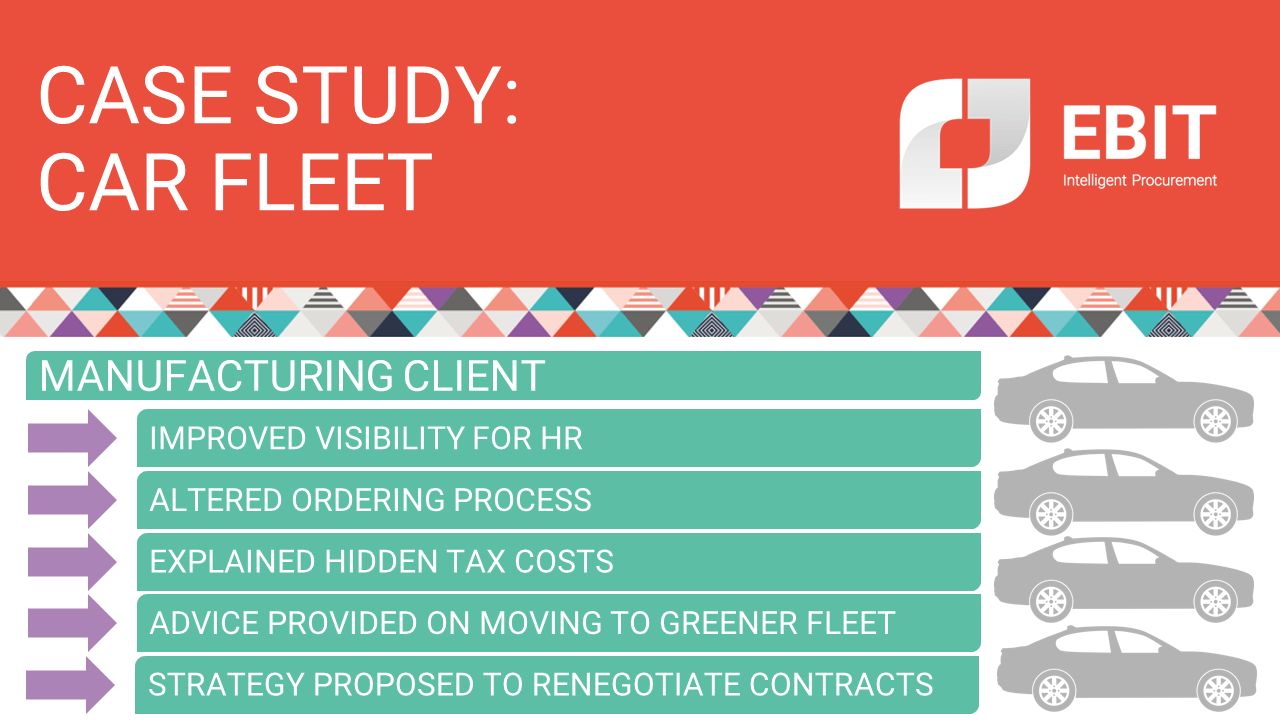Case study: Car fleet
Car fleet is a complex category to manage, with numerous factors that must be considered, such as on-costs of National Insurance and disallowed VAT as well as PAYE and National Insurance costs to the employee. It’s important to have a clear, unambiguous car fleet policy which is easy for HR to implement.
Here’s an example of how we can help:
About the client
Ebit worked with a manufacturing business that had two car fleet providers: Supplier A had sole supply of vehicles and Supplier B managed the day to day running of the service. As Supplier A and Supplier B are competitors, there were certain information flows deemed confidential that were consequently limited, impacting the service to the client. The client offers company cars to more than 200 employees with more than 150 driving cars and the balance of drivers taking a car allowance.
Project overview
Ebit was engaged to review the current situation and detail recommendations, taking the following into account:
- Numerous process issues required excessive HR resource, particularly with regard to driver fines taking months to resolve
- Poor real time visibility of the current fleet and car reordering
- Cars were not meeting the mileage parameters set for the contract, with an increasing under mileage that could not be recovered financially. This was exacerbated with Covid-19 and associated lockdowns
- Car choice was wider than necessary
- Total cost of ownership (TCO) recommendations were not being clearly explained by the suppliers
Results
From Ebit’s analysis it became clear that defining a process flow covering how the two suppliers engage and then work with the business was the key to improving operational and commercial visibility as well as ensuring ownership of the many tasks involved. This was prepared without impacting on the supplier’s confidentiality. It was then implemented by HR.
This led to improved visibility for HR, clear areas of responsibility and fewer driver complaints. In addition, clear regular reporting was provided to the client.
As a result of this project:
- Hidden tax costs to the employer were explained, highlighting expensive cars that should be excluded from the car list
- The ordering process was altered to clarify TCO and make it visible when new cars are being authorised
- A strategy was proposed to renegotiate and reduce the cost of existing contracts due to the lower actual mileages and to renew contracts on a very low mileage basis to recoup the value of the under milage over the remaining life of the individual contracts
- A review of car choices was carried out with recommendations as to which ones should be included in the future on a TCO basis
- Advice was provided on moving to a greener fleet

Car fleet is just one area of indirect spend that we can help with. Contact us today to find out more about our procurement services and how they might be able to help your business.
